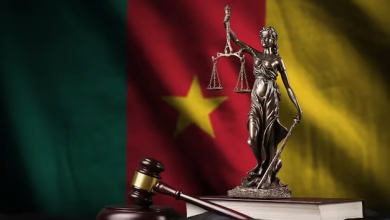10 Months Into 2025: How AI Is Reshaping Africa’s Legal Landscape
(A Legal Africa Special Report)

Introduction — The Silent Revolution in African Law
Ten months into 2025, one truth is undeniable: Artificial Intelligence (AI) has moved from being a distant buzzword to an active force shaping how African societies think, work, and govern. We’ve seen it redefine the tech economy, reshape media and entertainment, and even challenge politics. But quietly, a new revolution is unfolding in the legal space a sector once thought too traditional to bend to technology’s will.
Across Africa, lawyers, courts, and justice systems are waking up to the reality that AI isn’t just a futuristic tool; it’s a present necessity. From automating legal research to bridging the justice gap for rural citizens, AI is beginning to change the very architecture of how law functions on the continent.
1. The New Legal Assistant: AI in Law Firms
Across key African legal hubs South Africa, Nigeria, Kenya, Ghana, and Egypt firms are gradually adopting AI-powered tools to speed up routine work such as:
-
Document review and contract analysis: Tools like LawPavilion (Nigeria) and CaseRadar (South Africa) are reducing the time lawyers spend reviewing documents by up to 70%, freeing them to focus on litigation and strategy.
-
Legal research: AI-driven research assistants can now scan thousands of judgments and statutes in seconds, bringing precision and speed to what used to take days.
-
Drafting and due diligence: A few forward-thinking firms in Johannesburg and Lagos are piloting AI for due diligence and contract drafting, allowing younger associates to spend more time interpreting the law than typing it.
In Ghana, boutique firms are quietly experimenting with ChatGPT-based internal tools to prepare court documents, case summaries, and opinions a trend expected to expand as cost barriers reduce.
“It’s no longer about whether AI can do legal work. The question now is how ethically and efficiently we integrate it,” said one Accra-based managing partner interviewed by Legal Africa.
2. Beyond the Law Firm Walls — AI and Access to Justice
Perhaps the most transformative impact of AI lies outside big law. Across the continent, AI is giving ordinary people a voice in systems that once seemed unreachable.
In Kenya, for example, a start-up named LegalBot offers free legal guidance through a chatbot that responds in both English and Swahili. Citizens can inquire about tenant rights, employment issues, or small claims without stepping into a law office.
In Nigeria, an initiative backed by LawPavilion provides a local-language interface where users can access court decisions and simplified legal advice a major step toward democratizing access to justice.
In Tanzania and Morocco, courts are experimenting with AI for transcription and translation, ensuring multilingual hearings are fairer and faster.
This is AI’s humanitarian side using data, voice, and language models to bridge Africa’s justice gap.
3. Case Study 1 — Kenya’s Judiciary and the AI Adoption Policy
Kenya has become one of the first African countries to develop an AI Adoption Framework for the Judiciary. The framework envisions AI use in:
-
Electronic case filing and management
-
Court transcription and translation
-
Data-driven scheduling to reduce case backlog
The goal is simple: make justice faster and more transparent. According to early reports, pilot tests have already reduced filing and processing time in Nairobi’s High Court divisions.
“We want AI to serve justice, not replace it,” said a Kenyan judge at a recent AI-for-Justice forum.
4. Case Study 2 — Nigeria’s LawPavilion and the Rise of LegalTech
In Nigeria, LawPavilion stands as a flagship for homegrown legal innovation. Its suite of AI-driven tools now supports over 5,000 legal practitioners with intelligent research, precedent search, and document drafting.
In 2025, the company introduced TIMI AI, a virtual research assistant capable of scanning thousands of judgments and suggesting applicable case laws in seconds. This innovation has changed how lawyers, especially small practices, compete in an increasingly digital market.
5. Case Study 3 — UNESCO and the Eastern Africa Legal AI Guidelines
A recent UNESCO-led survey of judicial professionals in Eastern Africa found that 93% were familiar with AI tools, and 44% were already using them for tasks such as email drafting, research, and document summarization.
However, 91% reported a lack of institutional training or official AI guidelines.
In response, UNESCO and judicial partners are developing “AI and the Rule of Law” guidelines to promote fairness, transparency, and accountability when AI is used in justice systems.
This case underscores the critical need for policy and ethical frameworks before AI becomes deeply embedded in court processes.
6. Case Study 4 — South Africa’s Legal Data Revolution
In South Africa, several top firms are integrating predictive analytics into their litigation strategies. By training AI on past judgments, lawyers can now estimate case outcomes and settlement probabilities, improving client strategy and risk assessment.
Furthermore, the University of Cape Town has launched a “Legal AI Clinic” to train future lawyers on responsible use of machine learning tools in law. This mix of academic, professional, and ethical engagement shows South Africa’s head start in legal AI education.
7. The Challenges — Between Promise and Peril
Despite growing excitement, AI’s adoption in African legal systems faces notable barriers:
-
Low active usage: While over half of legal professionals are aware of AI tools, fewer than 25% use them regularly.
-
Ethical and bias concerns: Without regulation, AI could amplify inequalities in systems already burdened by limited access.
-
Lack of infrastructure: Many courts still operate manually; integrating AI will require digital infrastructure and reliable internet.
-
Capacity gaps: Most African law schools have yet to integrate AI into their curriculum, creating a knowledge vacuum among young lawyers.
“AI won’t destroy African law; our unpreparedness will,” a senior advocate from Lagos warned during a 2025 LegalTech Africa Summit.
8. The Way Forward — Law, Ethics, and Opportunity
The African Union’s Continental Strategy on Artificial Intelligence (2024) and the 2025 High-Level Policy Dialogue on AI Regulation in Africa have emphasized responsible innovation ensuring AI advances justice and equality, not exclusion.
For countries like Ghana, this is an opportunity to leapfrog not by copying Western models but by building AI systems rooted in local context, local languages, and legal pluralism.
As AI grows, Legal Africa’s role as both a storyteller and a watchdog becomes even more vital. The conversation on AI and law is not about machines replacing lawyers; it’s about human intelligence enhanced by technology to deliver a more equitable future.
Conclusion — The African Legal Mind Meets the Machine
Ten months into 2025, Africa’s legal profession stands at a crossroad. One path leads to greater efficiency, inclusivity, and innovation; the other, to confusion, bias, and displacement.
The defining question is not whether AI will change the law it already has.
The real question is whether Africa’s legal institutions can change fast enough to guide it.
As the continent’s lawyers, judges, and legal innovators rise to this challenge, one truth remains: the future of African justice may not wear a wig or gown it might speak through an algorithm trained on African wisdom.
By: El Mensah
Chief Editor, Legal Africa Magazine
October 2025 Edition




